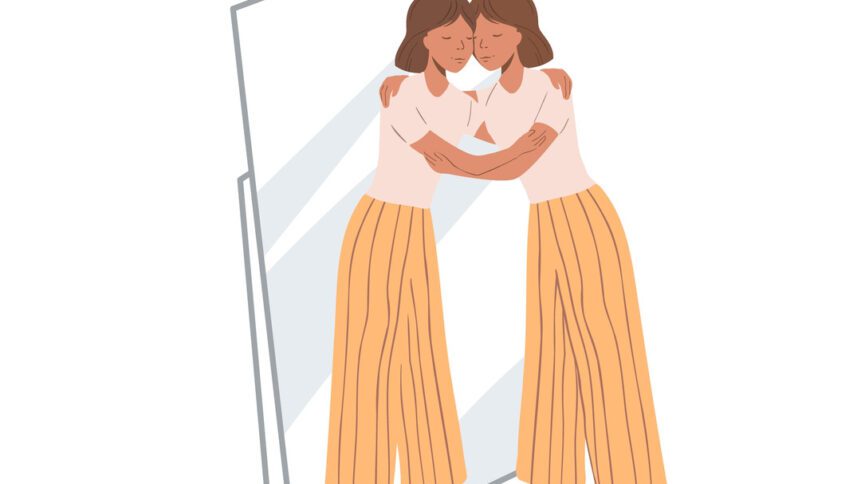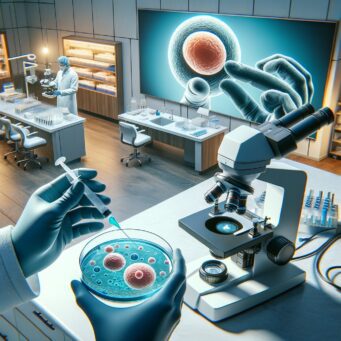
When you start the journey of trying to get pregnant, you expect your body will change. You anticipate the morning sickness and sore breasts, the cravings and fatigue. Maybe you optimistically buy stretch mark cream and start following cute maternity boutiques on Instagram.
But no one tells you the thousands of ways your body—and your relationship to her—will change when you try but don’t have a baby.
My relationship to my body started when I began practicing yoga in college. For the first time, I realized that my body wasn’t just a vessel for my brain. I learned to honor her as a sacred partner, and I was amazed to find that I could do so much more than I expected when I listened to her and gave her what she needed.
My first yoga teacher, a tiny Israeli woman with a thick accent and a loud laugh, would have us curl up in a ball before shavasana (final relaxation) and kiss our knees. I did it earnestly, thanking my body for the hard work she was doing for me.
Then I met my now-husband, who on our third date took me to Yosemite and taught me how to rock climb. That first time, I was scared to be six feet off the ground. My baby-soft fingertips couldn’t grip the rock, and I despaired of ever being able to pull myself up onto a ledge.
I kept climbing, scaling taller and taller mountains, until, a year later, I stood on top of Half Dome with him. After 15 hours of hiking and climbing, when we were 4,737 feet above the valley floor, he asked me to marry him.
My body was exhausted, and I could barely walk for days after, but I’ve never loved my body more than in that moment. She had taken me somewhere I never dreamed of going, had proven to me that I could truly do anything. She was a rock star.
A couple years later, when I wanted to have a family, I assumed that my body wouldn’t let me down. Everything in my experience told me that when I asked her to do something, she rose to the challenge.
When I wanted to have a family, I assumed that my body wouldn’t let me down. Everything in my experience told me that when I asked her to do something, she rose to the challenge.
Sure, there were some fertility issues in my family, but no one else in my family had ever climbed Half Dome either, so…clearly, I didn’t need to hold myself to that standard. After a few months of trying, my friend who had started trying at the same time I did got pregnant. I was genuinely happy for her. It was easy to be gracious when I knew my time was coming.
Six months of trying turned into a year. My friend’s baby was born, my rose-colored glasses became a little dusty, and then it happened—my very own two pink lines.
My husband and I celebrated and eagerly embraced the rituals. We told our families at eight weeks, when we heard the little heartbeat fluttering at 167 bpm. We signed up for an Amazon baby registry and got a used stroller from our neighbor. I bought a few gender-neutral outfits and cut the tags off. Later, I would look at those items and remember Ernest Hemingway’s six-word story: “For sale/Baby shoes/Never worn.”
At my twelve-week appointment, I told my husband not to come with me. “Don’t bother skipping work. There’s really not much to see yet anyway.”
When the doctor came in, he asked me how I was feeling. “Great!” I replied, chipper. “Any nausea or breast tenderness?” he asked. “Nope! If we hadn’t heard the heartbeat, I wouldn’t even know I was pregnant,” I joked.
I thought I was lucky, not experiencing any morning sickness or other symptoms besides fatigue and bloating. My doctor tilted his head, quizzically, and didn’t smile. That should’ve been my first warning.
Thirty minutes later, I called my husband, crying in the car. A missed miscarriage. Our baby had stopped developing somewhere around nine or ten weeks, and my body just…kept going with it. There was no blood, no cramping, nothing to indicate that anything was wrong. I like to think now that my body was trying desperately, quietly to hold on, maybe hoping that if the baby stayed in there a little longer, there would be a flicker of life again.
I drove to my husband’s office and we cried in the car together. The next day, we went in for a D&C.
Nothing can prepare you for waking up in the hospital room and being empty. Not just empty, but emptied – having it done to you, by your own body or by an unlucky draw of the cards. Knowing that four weeks before you went in for an ultrasound and heard a heartbeat, and today, there was nothing.
Nothing can prepare you for waking up in the hospital room and being empty. Not just empty, but emptied – having it done to you, by your own body or by an unlucky draw of the cards. Knowing that four weeks before you went in for an ultrasound and heard a heartbeat, and today, there was nothing. Knowing that just yesterday, even after you learned the devastating news, your body still felt pregnant.
It seemed like a cruel joke. But when I woke up in the hospital, I felt the carve-out, the emptiness. Not metaphorically—literally. The literal pit in my belly where a baby used to be.
It wasn’t that I felt betrayed by my body, exactly. It was more that she had finally been defeated, and I saw her in a new light: You’re not as strong as I thought you were. It was like after your first fight with a significant other. Suddenly, you get a sense of where the lines are drawn. We had found my body’s limit, and that boundary was keeping me from the one thing I wanted most.
Two years and another miscarriage later, my body and I are still here, still waiting. We’re like two roommates who don’t really like each other, occupying the same space but huffing moodily every time the other one leaves the kitchen light on or forgets to put the trash out, leaving passive aggressive notes on the counter: Please put my sweater back when you’re done borrowing it. Like two begrudging classmates who have to work on a project together: Have you done your part yet?
Two years and another miscarriage later, my body and I are still here, still waiting.
In the last few years, I’ve overhauled my diet, eating specific fruits and veggies in sync with my cycle. I’ve tried acupuncture. Massage. Bee pollen. Essential oils.
We’ve tried timed sex and the opposite—not looking at the calendar. We’ve tried relaxing. We’ve tried alcohol…and no alcohol.
We’ve tried Clomid and three IUIs— the third of which resulted in the most recent miscarriage. I switched to all-natural cleaning products and made my own weed killer. I broke down and bought a non-toxic deodorant that actually isn’t too bad.
Now here we are, a few days before I’m scheduled to start taking the daily shots that will swell my ovaries to the size of grapefruits so that a doctor can go in and extract as many of my eggs as possible. We had to clear out a shelf in the fridge to make space for all of the shots and vials.
On the counter sits a bottle of baby aspirin, a stack of needles, a box of alcohol wipes, and a biohazard waste disposal container. Last week, the nurse walked us through how to put together the shots, putting the little vial in the tube, attaching a needle, twisting the pen to the right dosage, and inserting the needle into a soft little rubber ball on her desk.
She looked me in the eyes and told me, “This will be unlike anything you’ve ever experienced before.” I nodded soberly, eyes wide.
This morning I laid in bed, thinking of my body, remembering all of the good times we’ve had, remembering all of the things I thought I could never do—and then she did them. She has carried me and comforted me and loved me even when I didn’t love her back.
Now I’m asking her to do this one more thing, which will really be a thousand things: Endure shots and pills and hormones and more tears— so many tears— just to give me the chance of being a mom.
I curled myself into a ball and kissed my knees. Thank you, I thought, for what you’re doing for me.
Contributor
Ariel Curry
Ariel Curry is an editor and writing coach with 10 years of experience in publishing. She enjoys brainstorming and outlining new book ideas, bringing clarity and purpose to prose, and helping authors find resilience in their writing journey. Ariel lives in Chattanooga, TN, with her husband and their dogs, Enyo and Tenaya.

Listen to stories, share your own, and get feedback from the community.


















